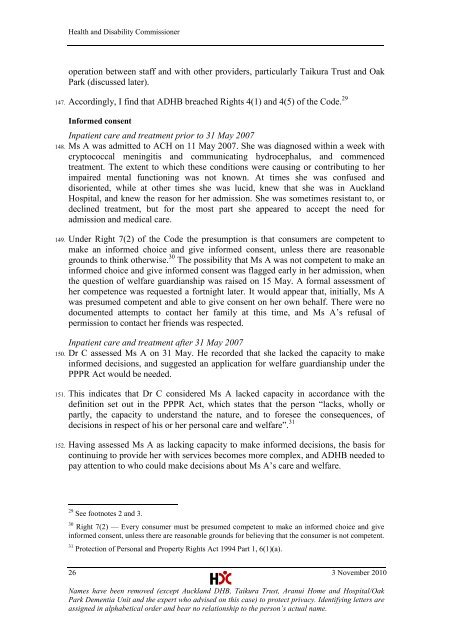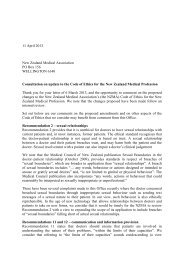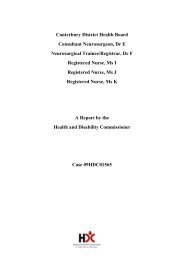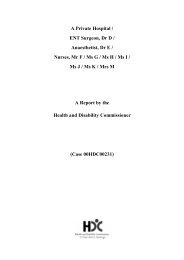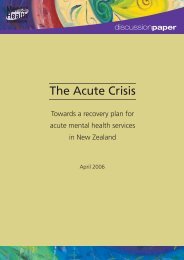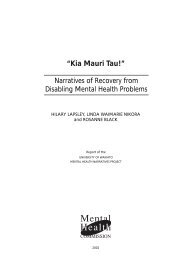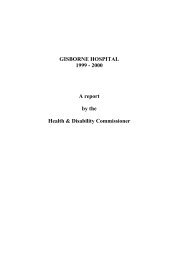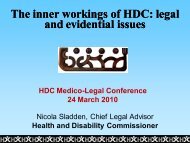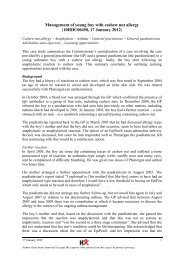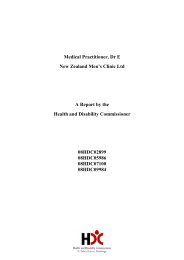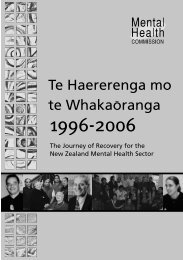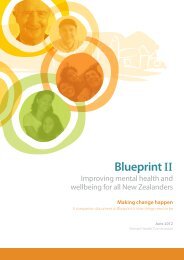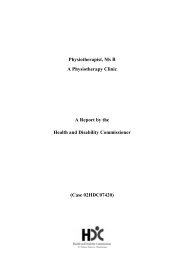Auckland District Health Board Taikura Trust Aranui Home and ...
Auckland District Health Board Taikura Trust Aranui Home and ...
Auckland District Health Board Taikura Trust Aranui Home and ...
Create successful ePaper yourself
Turn your PDF publications into a flip-book with our unique Google optimized e-Paper software.
<strong>Health</strong> <strong>and</strong> Disability Commissioner<br />
operation between staff <strong>and</strong> with other providers, particularly <strong>Taikura</strong> <strong>Trust</strong> <strong>and</strong> Oak<br />
Park (discussed later).<br />
147. Accordingly, I find that ADHB breached Rights 4(1) <strong>and</strong> 4(5) of the Code. 29<br />
Informed consent<br />
Inpatient care <strong>and</strong> treatment prior to 31 May 2007<br />
148. Ms A was admitted to ACH on 11 May 2007. She was diagnosed within a week with<br />
cryptococcal meningitis <strong>and</strong> communicating hydrocephalus, <strong>and</strong> commenced<br />
treatment. The extent to which these conditions were causing or contributing to her<br />
impaired mental functioning was not known. At times she was confused <strong>and</strong><br />
disoriented, while at other times she was lucid, knew that she was in <strong>Auckl<strong>and</strong></strong><br />
Hospital, <strong>and</strong> knew the reason for her admission. She was sometimes resistant to, or<br />
declined treatment, but for the most part she appeared to accept the need for<br />
admission <strong>and</strong> medical care.<br />
149. Under Right 7(2) of the Code the presumption is that consumers are competent to<br />
make an informed choice <strong>and</strong> give informed consent, unless there are reasonable<br />
grounds to think otherwise. 30 The possibility that Ms A was not competent to make an<br />
informed choice <strong>and</strong> give informed consent was flagged early in her admission, when<br />
the question of welfare guardianship was raised on 15 May. A formal assessment of<br />
her competence was requested a fortnight later. It would appear that, initially, Ms A<br />
was presumed competent <strong>and</strong> able to give consent on her own behalf. There were no<br />
documented attempts to contact her family at this time, <strong>and</strong> Ms A’s refusal of<br />
permission to contact her friends was respected.<br />
Inpatient care <strong>and</strong> treatment after 31 May 2007<br />
150. Dr C assessed Ms A on 31 May. He recorded that she lacked the capacity to make<br />
informed decisions, <strong>and</strong> suggested an application for welfare guardianship under the<br />
PPPR Act would be needed.<br />
151. This indicates that Dr C considered Ms A lacked capacity in accordance with the<br />
definition set out in the PPPR Act, which states that the person ―lacks, wholly or<br />
partly, the capacity to underst<strong>and</strong> the nature, <strong>and</strong> to foresee the consequences, of<br />
decisions in respect of his or her personal care <strong>and</strong> welfare‖. 31<br />
152. Having assessed Ms A as lacking capacity to make informed decisions, the basis for<br />
continuing to provide her with services becomes more complex, <strong>and</strong> ADHB needed to<br />
pay attention to who could make decisions about Ms A’s care <strong>and</strong> welfare.<br />
29 See footnotes 2 <strong>and</strong> 3.<br />
30 Right 7(2) — Every consumer must be presumed competent to make an informed choice <strong>and</strong> give<br />
informed consent, unless there are reasonable grounds for believing that the consumer is not competent.<br />
31 Protection of Personal <strong>and</strong> Property Rights Act 1994 Part 1, 6(1)(a).<br />
26 3 November 2010<br />
Names have been removed (except <strong>Auckl<strong>and</strong></strong> DHB, <strong>Taikura</strong> <strong>Trust</strong>, <strong>Aranui</strong> <strong>Home</strong> <strong>and</strong> Hospital/Oak<br />
Park Dementia Unit <strong>and</strong> the expert who advised on this case) to protect privacy. Identifying letters are<br />
assigned in alphabetical order <strong>and</strong> bear no relationship to the person’s actual name.


